
- Articles
Separation of Church and State — Worshipping at the Altar of Secular Civic Religion? by Miguel A. Faria, MD
Note: The article below written years ago served as a springboard for Dr. Faria’s “Chapter 12 Separation of Church and State—Worshipping at the New Altar of Civic Religion?” in Contrasting Ideals and Ends in the American and French Revolutions published in December 2024 by Cambridge Scholars Publishing, Newcastle upon Tyne, UK. The article was fully expanded, revised, and updated for the chapter in that book, which is frankly much improved. — Editor.
————————–
“Congress shall make no law respecting an establishment of religion, or prohibiting the free exercise thereof; or abridging the freedom of speech, or of the press; or the right of the people peaceably to assemble, and to petition the Government for a redress of grievances”
— First Amendment in the Bill of Rights
An increasing number of mainstream press articles and responses in Letters to the Editor discuss the political concept of “separation of church and state”; frankly, many of them miss the mark. Our Founding Fathers, even Thomas Jefferson, interpreted something completely different in the “establishment of religion” clause of the First Amendment to the Constitution than what liberal pundits today are leading us to believe.
First, the phrase “separation of church and state” does not appear in the U.S. Constitution or any of our founding documents, but only in the fecundity of memoranda of ACLU lawyers and court rulings of activist judges.
Secularism and Societal Decay
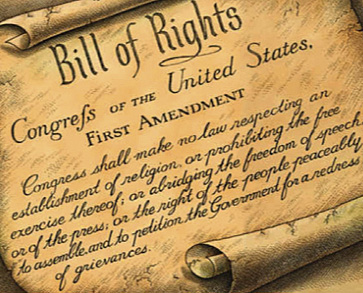
What the First Amendment to the U.S. Constitution says is “Congress should make no law respecting an establishment of religion, or prohibiting the free exercise thereof”; it does not proscribe religion from political life. The Founders were very aware that Judeo-Christian religion supports the moral code and ordered liberty. The Founders knew the value of religion upon morality and society and guaranteed religious freedom as one of the first of the Natural and Constitutional rights enshrined in the First Amendment.
And today, because of the banishment of religion from public life, particularly in our schools, the chickens of unrestrained immorality and violence and general social decay have come home to roost.
By jettisoning the Judeo-Christian principles upon which this nation was founded, coupled with the growth of government in our private and public lives, our children have paid the price and suffered greatly in their personal and academic lives. Moreover, our youth are growing up devoid of a moral compass, discipline, and even a desire to learn and become better citizens. This is reflected in poor academic performance, alienation, and increasing rates of illegitimacy, illiteracy, and hooliganism.
We worry about children with guns, violence in schools, and street crime. We wonder why we have so much immorality, crime, broken families, etc. This disintegration of the moral foundations of our society has been the result of the loss of religious and moral principles, leading increasingly to a lack of discipline, self-respect, and moral restraints.
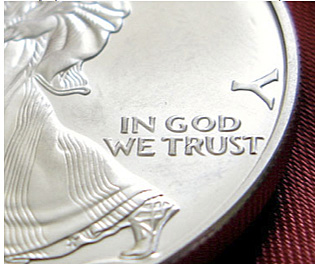
School prayer and the Ten Commandments have already been removed from government schools and most public places. Should we also extirpate such phrases as “God Bless America,” “In God We Trust,” etc., because someone is offended? There is no constitutional right of protection against being offended. Flag burning, nude dancing and other forms of offensive speech, as distasteful as they may be to many Americans, are permitted. The Supreme Court has even ruled that as offensive as the Westboro Baptist Church funeral protests were, nevertheless, they were protected free speech. And yet, many politicians want to ban religion completely from public life because it is offensive to various sects and political groups.
Freedom of Worship Spearheaded in New Jersey and Virginia in the 1780s
Our Constitution gives us freedom of worship, not proscription of religion in personal and public life. All ten of the enumerated rights enshrined in the Bill of Rights secure individual liberties and limit the power of government. They do not establish government policy. Why would the “free exercise of religion” clause be any different?
The “separation of church and state,” if we may call it that, really referred to the refusal of the establishment of a state religion. Our Founders correctly rejected not only the formation of a theocracy but also the establishment of an official state religion, as was the case in Great Britain, the nation from which they had just separated.
Our Founders were sons of the Enlightenment and decried an official religion supported by the state to the exclusion and detriment of other Judeo-Christian denominations. Beginning in the late 1760s through the 1780s, Calvinist opposition to an official state religion developed in New Jersey around the remarkable region of Elizabethtown and the College of New Jersey (later Princeton), led by Presbyterian leaders John Witherspoon (1723-1794), Elias Boudinot (1740-1821), and William Livingston (1723-1790).
The Southern Founders, led by Thomas Jefferson (1743-1826) and James Madison (1751-1836) in Virginia, agreed and were equally and firmly opposed to having the establishment of the Anglican or Episcopalian Church as the state-supported, official religion for the United States. They all strongly concurred in freedom of conscience and freedom of religion.
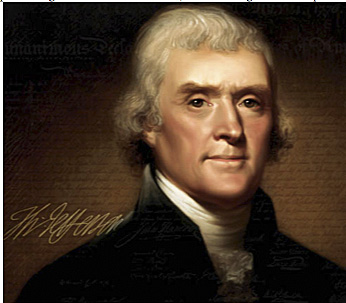
The phrase “a wall of separation” in church and state affairs is derived from the query made by the Danbury Baptist Association of Connecticut in 1801, regarding an opinion on the establishment of a religious denomination in their state, sent to Thomas Jefferson, the newly elected President of the United States. To this query, Jefferson responded: “…I contemplate with sovereign reverence that act of the whole American people which declared that their legislature should ‘make no law respecting an establishment of religion, or prohibiting the free exercise thereof,’ thus building a wall of separation between Church and State.”
Jefferson’s private opinion is perhaps the strongest among the Founders and has been used repeatedly by activist judges as if the phrase was contained in the U.S. Constitution to ban religion from public life. But this “wall of separation” refers only to the official forbiddance of the establishment of a state religion as enumerated in our U.S. Constitution, and not to a ban on religion in public life or an encroachment on religious liberty.
Official State Religions — The English and Scottish Experience
The Founders were well aware of what state religion meant in Great Britain, where the head of state, the king, was the head of the Church of England; where the monarch appointed bishops; where the House of Lords composed of Temporal Lords (i.e., the nobility) and the Spiritual Lords (i.e., Bishops and Archbishops) ruled as the Upper House; where all citizens including Catholics, Puritans, Methodists, Presbyterians, and other Dissenters, pay taxes for the Church of England, a church to which they did not belong; where Catholics could not even hold public office and were persecuted, including the Irish Catholics in their own country!
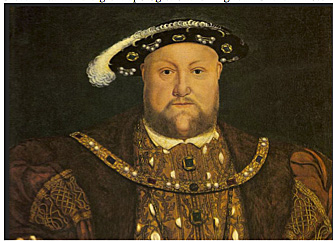
Winston Churchill, the great English statesman, orator, historian, and World War II Prime Minister of Great Britain and a great apologist of the Anglican Church wrote that even as far back as the Reformation and the reign of Henry VIII and his bigamous marriage to Anne Boleyn, “the clergy were prohibited from preaching unless licensed, and a Bidding prayer was prescribed for use in all Churches of England… ‘Henry VIII being immediately next unto God…’ ” And Catholics continued to be excluded from holding office and persecuted in Great Britain until the advent of the Catholic emancipation process in the 19th Century and Irish home rule in the 20th Century.
America’s Founders were also familiar with the historic situation in Scotland during the Reformation and before the Act of Union with Great Britain. The Presbyterian Church led by John Knox (1514-1572) had ruled as a virtual theocracy, enforced conformity throughout the land, persecuted Catholics, burned heretics, and had even manipulated the effective deposition of Mary Queen of Scotts (1542-1587), who ended up losing her head to Elizabeth I, Good Queen Bess (r. 1558-1603). The Founders with historic insight and good reason wanted no repetition of this kind of experience in America!*
Invaluable Support to the Moral Code
Faith and religion provide an invisible support to the moral code, encourage discipline, and promote civility. Their influence on moral conduct and overt behavior is certain. Elias Boudinot, a devout Presbyterian, President of the Continental Congress in 1783 and a later trustee of Princeton for nearly fifty years wrote:
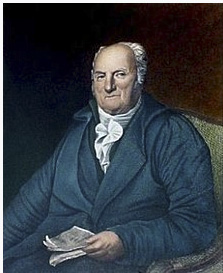
“Good government generally begins in the family, and if the moral character of a people once degenerate, their political character must soon follow.”
Without the prop of religion and our churches, crime would certainly increase, and then the state would have the usual reason or excuse, or even pretext, to step in, to pass more laws against the law-abiding citizens, and to suppress more liberties, all in the name of combating lawlessness and crime.
Religious instruction encourages and helps maintain civility, morality, and lawful behavior, so that law and order is preserved easier with less of a police force present. It is only the authoritarian and totalitarian states that require no religious instruction to prop up the moral code. Tyranny maintains law and order by brute force and repression– thus the required monopoly of power wielded by the State. Such authoritarian states have no need for kindly persuasion and religion, and when the church is allowed to exist, it is subordinated to the state, as in Cuba and China today, or the former Soviet Union during the Cold War.
Thus, I find the Judeo-Christian religion beneficial to the survival of Western Civilization and a just bulwark against anarchy on the one hand and the rise of socialism and tyranny on the other.
Most authoritative biographies of the Founding Fathers reveal that in public life these great men displayed orthodox, Christian thinking, and Judeo-Christian ethics. They rejected theocracy, as most of us Americans do, but that is a far cry from what many liberal academicians espouse today — i.e., that religion should have no role in government and that religious people should not be seen or heard!
The philosopher Aristotle asserted that the means between extremes was for the best. At present, the extreme application of “separation of church (i.e., the Christian religion) and State” has moved us inexorably to the secular extreme, as to exclude Judeo-Christian principles from public life. Curiously, to the neutral observer, this is perplexing for a nation founded largely by patriotic men steeped in Judeo-Christian principles, particularly when various sects currently in vogue, such as Santeria in South Florida has been protected even with rites of animal sacrifices; Hindu festivals have been promoted in various communities; and even Sharia law has been seriously discussed as an alternative to common law by activist jurists! And yet, communities have been under attack for displaying Christian symbols during Holy Week and Christmas and the use of Christian phrases, such as “In God We Trust.” The truth is Christianity has received a bad rap in the last several decades by the ACLU, the courts, and the secular establishment. It is high time we acknowledge this fact and extend the toleration due to the faith upon which this nation was founded.
And fear no straw man; there is no chance we will establish a theocracy in the U.S., but the opposite is more likely, the establishment of a completely secular, socialist state, where might is right and where government power becomes the civic religion of the state, the altar to which we are all forced to worship — and to the detriment of our remaining individualism and liberty.
Suggested Reading
1) Ellis, JE. American Sphinx — The Character of Thomas Jefferson. New York, NY, Alfred A. Knopf, 1997.
2) Ketcham, R. James Madison — A Biography. Charlottesville, VA, University Press of Virginia, 1990.
3) McCullough, DG. John Adams. New York, NY, Simon and Schuster, 2001.
4) Randall, WS. Alexander Hamilton — A Life. New York, NY, HarperCollins Publishers, 2003.
5) Barton, D. The Myth of Separation: What Is the Correct Relationship Between Church and State? Aledo, TX, Wallbuilders Press, 1992.
6) Churchill, W. A History of the English-Speaking Peoples. New York, NY, Dorset Press, Book IV, p. 64.
* The English Civil War (1642-1649) was a dark chapter in the history of Great Britain and a lesson on the evils of war, particularly when religion is involved. Reading a book on the history of Scotland, I learned that although the English Puritans and the Scottish Presbyterians favored a Protestant theocracy and followed the stern sobriety of Calvinism, they differed in their outlook and politics during the English Civil War in that the Scotts were influenced by the charitable teachings of the New Testament, whereas the Puritans continued to emphasized by the austerity of the Old Testament. It was the English parliament of Puritans, Roundheads, and Oliver Cromwell that condemned and executed the Stuart king Charles I (r. 1625-1649).
Written by Dr. Miguel A. Faria
Miguel A. Faria, Jr., M.D. is Clinical Professor of Surgery (Neurosurgery, ret.) and Adjunct Professor of Medical History (ret.) Mercer University School of Medicine; Member of the Editorial Board of Surgical Neurology International and World’s Affair Editor (SNI; 2011-); Ex-member of the Injury Research Grant Review Committee of the Centers for Disease Control and Prevention (CDC; 2002-05); Founder & Editor-in-Chief of the Medical Sentinel (1996-2002); Editor Emeritus, the Association of American Physicians and Surgeons (AAPS); Author, Vandals at the Gates of Medicine (1995); Medical Warrior: Fighting Corporate Socialized Medicine (1997); and Cuba in Revolution: Escape From a Lost Paradise (2002).
An edited version of this article was published in GOPUSA.com on April 19, 2012.
This article may be cited as: Faria MA. Separation of Church and State — Worshipping at the Altar of Secular Civic Religion? HaciendaPublishing. April 19, 2012. Available from: https://haciendapublishing.com/separation-of-church-and-state-worshipping-at-the-altar-of-secular-civic-religion-by-miguel-a-faria-md/.
Copyright ©2012 Miguel A. Faria, Jr., MD
1 thought on “Separation of Church and State — Worshipping at the Altar of Secular Civic Religion? by Miguel A. Faria, MD”
Thomas Paine atheist or agnostic?
Your first three quotations sent by email by a reader, Mr. Lin, support my article, recognizing that all three of the Founders quoted were Protestant and as British descendants quite hostile to the Catholic faith; In fact John Adams, who, incidentally, is one of my heroes and whose biography by David McCullough, “John Adams.”(2001), is one of the best ever written, was a Puritanical Republican with deistic tendencies, who disliked kings and priests. Read his biography.
But quotations without explanations as to where they were extracted, truncated from their source, are frequently not useful because they are incomplete or taken out of context or separated from their original meaning. Nevertheless, in reply, let me cite:
“Can the liberties of a nation be secure when we have removed a conviction that these liberties are the gift of God?”— Thomas Jefferson
“Our Constitution was made only for a moral and religious people. It’s wholly inadequate for the government of any other.” —John Adams, 1789.
“The fundamental source of all your errors, sophisms and false reasonings is a total ignorance of the natural rights of mankind. Were you once to become acquainted with these, you could never entertain a thought, that all men are not, by nature, entitled to a parity of privileges. You would be convinced, that natural liberty is a gift of the beneficent Creator to the whole human race, and that civil liberty is founded in that; and cannot be wrested from any people, without the most manifest violation of justice.” –Alexander Hamilton, The Farmer Refuted, 1775
“Whereas it is the duty of all Nations to acknowledge the providence of Almighty God, to obey His will, to be grateful for His benefits, and humbly to implore His protection and favor…”— George Washington, 1789 Thanksgiving Proclamation
Finally, as to the Thomas Paine’s quote, it should be clarified that Thomas Paine lost his popularity and, in fact, fell from the pedestal as a Founding Father, as he became more radical in his views, espoused the French Revolution (and almost lost his head to the guillotine), and viciously attacked President George Washington in letters. He also wrote The Age of Reason, a work which embraced atheistic views of French Rationalism. But as William J. Federer noted in his book, America’s God and Country — an encyclopedia of quotations (1994) — in his later years, Thomas Paine had a profound change in his religious views and wrote:
“I would give worlds, if I had them, if The Age of Reason had never been published. O Lord, help! Stay with me! It is hell to be left alone.” And on his deathbed, he wrote: “I die in perfect composure and resignation to the will of my Creator, God.”— Dr. Miguel Faria